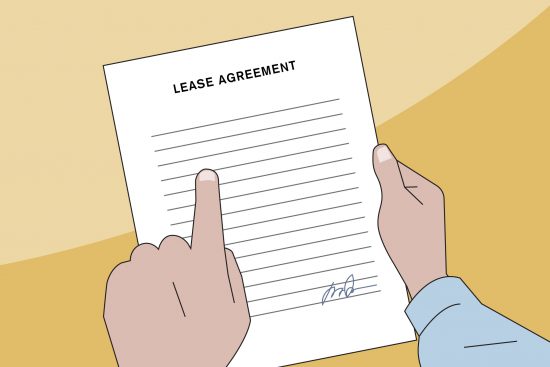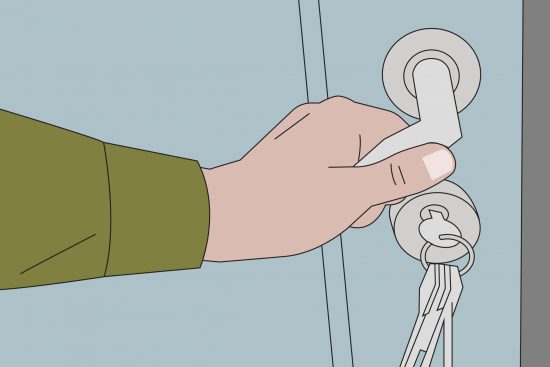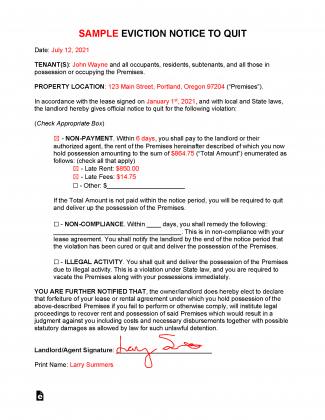- Non-Payment of Rent ($)
- Non-Compliance
- Illegal Activity
- Month-to-Month Termination
- Providing False Information
- Safety Violation
- Step 1 – Identifying the Violation
- Step 2 – Serve Notice to the Tenant
- Step 3 – Tenant Replies
- Step 4 – Comply or Vacate
- Step 5 – Serving Court Papers
- Step 6 – Tenant’s Answer
- Step 7 – Go to the Court hearing
- Step 8 – File the Writ of Possession
What is an Eviction Notice?
An eviction notice is an official notice that describes a lease violation sent by the landlord to the tenant. The most common is late rent but can for any default by the tenant. If the tenant does not cure the issue by the end of the notice period, they will be asked to vacate the premises.
Eviction Notices (6)
Non-Payment of Rent ($) – Or “notice to pay or quit”, requires the tenant pay-in-full the balance due to the landlord or remove themselves from the property.
Non-Compliance – Or “notice to comply or quit”, can be used for any lease violation other than late rent. The tenant will have the notice period to comply with the lease violation.
Illegal Activity – For any criminal activity that takes place on the property.
Month-to-Month Termination – Gives 30 days’ notice to the other party.
Providing False Information – Directed toward an applicant who entered misleading information on their rental application.
Safety Violation – When the tenant is breaking the lease due to non-compliance with local laws or rules of the property. An example of this could be having a barbeque grill on a non-compliant balcony.
How to Evict a Tenant (8 steps)
- Step 1 – Identifying the Violation
- Step 2 – Serve Notice to the Tenant
- Step 3 – Tenant Replies
- Step 4 – Comply or Vacate
- Step 5 – Serving Court Papers
- Step 6 – Tenant’s Answer
- Step 7 – Go to the Court hearing
- Step 8 – File the Writ of Possession
Step 1 – Identifying the Violation

The landlord identifies the lease violation and checks the laws to ensure they are acting within their rights. An eviction can take 30-120 days depending on the jurisdiction.
Step 2 – Serve Notice to the Tenant

The notice must be sent to the tenant in a State-approved method. It’s recommended to always send via Certified Mail with a return receipt. This ensures a person at the resident will have acknowledged receiving the notice. The notice period starts on the day the tenant receives the notice.
Step 3 – Tenant Replies

The tenant will most commonly not want to break their lease and will contact the landlord. If there are any accommodating issues it is advised both the landlord and tenant communicate with one another. If the tenant does not reach out, the landlord could be facing an eviction.
Step 4 – Comply or Vacate

If the tenant complies with the notice, the lease is back in compliance as if the violation never occurred. On the other hand, if the tenant has not responded and remains in violation, they will be ordered to vacate the property immediately. This can be motivated by the landlord filing a Complaint and Summons in the local housing court.
When any court papers are filed an eviction is now in the public record and in the tenant’s name. Already a lot of damage has been done to the tenant’s credit profile.
Step 5 – Serving the Court Papers

At this time the tenant will be served with papers of a case being filed against them. The landlord is suing the tenant and attempting to remove them from the premises through a forcible entry and detainer (FED) lawsuit.
Step 6 – Tenant’s Answer

If the tenant wants to go forward with the case, they will have to file an Answer. The court usually grants between 20 to 30 days for the tenant to file their version of the case. After this has been filed, a copy will be sent to the landlord and a cour hearing date will be scheduled.
Step 7 – Go to the Court Hearing

At the court hearing, the Judge will hear both sides of the case and make a ruling. If the Judge rules in favor of the landlord, a Judgment will be given to the landlord in a monetary value for the damages made by the tenant. The Judge will also issue a Writ of Possession.
Step 8 – File the Writ of Possession

After issuance of the Writ of Possession by the Judge, the landlord will need to file the form with the local Sherriff’s office to forcibly remove the tenant from the premises. This commonly involves the tenant leaving the home and the Sherriff’s office changing the locks. After the locks have been changed the landlord will be given possession of the property.
Sample – Eviction Notice

When Rent is Late (State Laws)
| State | Rent Grace Period | Notice to Pay or Quit | |||
| Alabama | None (§ 35-9A-161(c)) | 7-day notice (Section 35-9A-421(b)) | |||
| Alaska | None (AS 34.03.020(c)) | 7-day notice (AS 34.03.220(b)) | |||
| Arizona | None (§ 33-1368(B)) | 5-day notice (§ 33-1368(B)) | |||
| Arkansas | None (§18-17-401) | 5-day notice (§18-17-901) | |||
| California | None (§1947.3) | 3-day notice (§ 1161) | |||
| Colorado | None (No Statute) | 3-day notice (§13-40-107) | |||
| Connecticut | 9 days (§ 47a-15a) | Within grace period (§ 47a-23) | |||
| Delaware | 3 days (Tit. 25 § 55o2) | 5 days (Tit. 25, § 5502) | |||
| Florida | None (§ 83.46(1)) | 3 days (§ 83.56(3)) | |||
| Georgia | None (No Statute) | Immediate upon notice (§ 44-7-50) | |||
| Hawaii | None; except a 3-day period for tenants receiving public assistance (§ 521-21) | 15 days (§ 521-68) | |||
| Idaho | None (No Statute) | 3 days (§ 6-303) | |||
| Illinois | None (No Statute) | 5 days (735 ILC 5/9-113) | |||
| Indiana | None (No Statute) | 10 days (§ 32-31-1-6) | |||
| Iowa | None (562A.9(3)) | 3 days (§ 562A.27) | |||
| Kansas | None (§ 58-2545(c)) | 3 days (§ 58-2564) | |||
| Kentucky | None (§ 383.565(2)) | 7 days (§ 383.660) | |||
| Louisiana | None (La. Civ. Code art. 2703(1)) | 5 days (CCP § 4701) | |||
| Maine | 15 days (§ 6028) | 7 days (§ 6002) | |||
| Maryland | None (§ 8-401(a)) | Immediate upon notice (§ 8-401) | |||
| Massachusetts | 30 days (ch. 186, § 15(1)(c)) | 14 days (ch. 186, § 11) | |||
| Michigan | None (§ 554.131) | 7 days (§ 600.5714) | |||
| Minnesota | None (No Statute) | Immediate upon notice (§ 504B.285) | |||
| Mississippi | None (No Statute) | 3 days (§ 89-7-27) | |||
| Missouri | None (Rev. § 535.060) | Immediate upon notice (§§ 535.020, | Montana | None (§ 70-24-201(2)(c)) | 3 days (§ 70-24-422) |
| Nebraska | None (§ 76-1414(3)) | 7 days (§ 76-1431) | |||
| Nevada | None (NRS 118A.210(1)) | 7 days (§40.253) | |||
| New Hampshire | None (No Statute) | 7 days (§ 540:3) | |||
| New Jersey | 5 days (§ 2A:42-6.1) | Immediately upon notice (§ 2A:18-61.2) | |||
| New Mexico | None (§ 47-8-15(B)) | 3 days (§ 47-8-26) | |||
| New York | 5 days (Real Prop. §7-238A) | 14 days (Real Prop. Acts §7-11) | |||
| North Carolina | 5 days (§ 42-46) | 10 days (§ 42-3) | |||
| North Dakota | None (No Statute) | 3 days (§ 47-32) | |||
| Ohio | None (No Statute) | 3 days (§§ 1923.02, 1923.04) | |||
| Oklahoma | None (§ 41-109(B)) | 5 days (§ 41-131) | |||
| Oregon | 4 days (§ 90.260) | 6 days if rent remains unpaid after grace period; or 3 days if rent goes unpaid for 8 days after due date (§ 90.394) | |||
| Pennsylvania | None (No Statute) | 10 days (§ 250.501) | |||
| Rhode Island | None (§ 34-18-15(c)) | 5 days (§ 34-18-35) | |||
| South Carolina | None (§ 27-40-310(c)) | 5 days (§ 27-40-710) | |||
| South Dakota | None (No Statute) | 3 days (§21-16-1) | |||
| Tennessee | 5 days (§ 66-28-201) | 14 days (§ 66-28-505) | |||
| Texas | None (No Statute) | 3 days (§ 24.005) | |||
| Utah | None (No Statute) | 3 days (§ 78B-6-802) | |||
| Vermont | None (§ 4455) | 14 days (§ 4467) | |||
| Virginia | 5 days (§ 55.1-1204(C)(5)) | 14 days (§ 55.1-1245) | |||
| Washington | None; but late fees may not be assessed until 5 days after due date (RCW 59.18.170) | 14 days (§ 59.12.030) | |||
| Washington D.C. | 5 days (§ 42-3505.31) | 30 days (§ 42-3505.01) | |||
| West Virginia | None (No Statute) | Immediate upon notice (§ 55-3A-1) | |||
| Wisconsin | None (No Statute) | 5 days (§ 704.17) | |||
| Wyoming | None (No Statute) | 3 days (§ 1-21-1003) |